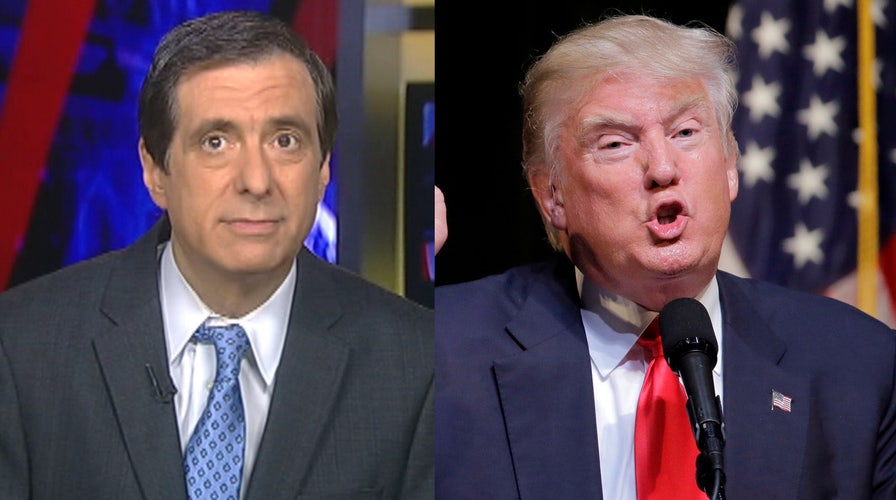Kurtz: NY Times hammers Trump on Dallas
'MediaBuzz' host Howard Kurtz reacts to The NY Times' bias when reporting on Donald Trump's reaction to the Dallas shootings
In the wake of Dallas, Donald Trump is getting pummeled by the press.
In the wake of James Comey, Hillary Clinton is getting thumbs down from a majority of voters.
And these dynamics are unfolding at a crucial stretch of the campaign: Trump must settle on a running mate in the next couple of days, while Clinton needs to pick a running mate by next week.
Let’s start with Trump. It’s true, according to my sources, that his campaign had a daylong debate on how to respond to the murder of five police officers in Dallas, and took the cautious route. Trump gave no interviews and limited himself to a few comments on Twitter and a 90-second Instagram video. “Prayers and condolences to all of the families who are so thoroughly devastated by the horrors we are all watching take place in our country,” Trump tweeted.
It’s also true that the campaign reached out to try to set up a meeting with New York police officers, and this was vetoed by Police Commissioner Bill Bratton. I’m told Trump was quite angry that his staff made this move without his knowledge.
Still, Trump basically struck a note of unity. But look at the way the New York Times renders this in a news story:
His advisers “raced to do the seemingly impossible: transform an often hotheaded candidate into a figure of leadership and calm.”
The episode “highlighted just how limited Mr. Trump has proved in the general election — a figure so volatile and hard-line that simply speaking in public can be a risk.”
And despite Trump’s caution, “he might still have paid a price for his tendency for fulmination and fury”—because Clinton did speak out on the shootings in interviews and appearances.
Bottom line, also in the aftermath of Orlando, according to the Times: “His advisers have tried to seize opportunities for him to project a sense of calm leadership. So far, this has been unsuccessful.”
Keep in mind, that's a news story, not an op-ed or editorial.
Washington Post columnist Chris Cillizza pronounced Trump’s last two months “absolutely disastrous.”
Trump should have remained laser-focused on the FBI scolding of her mishandling of classified information, he writes. But at a Cincinnati rally last week, “something snapped. He threw away the notes and lit into the media — and society, more generally — over two recent controversies: (1) his campaign tweeting out and then removing an image that looked suspiciously like the Star of David, and (2) his comments about how late Iraqi dictator Saddam Hussein was ‘so good’ when it came to dealing with terrorists…
“It’s hard to explain how bad that turnaround is for Trump. And how avoidable it all was. What’s even more remarkable is that he seemed to have the blueprint — read the speech, blast Clinton, get out of the way — for a good day. Instead, he voluntarily dipped into two issues — debating whether he was anti-Semitic and defending his praise for a brutal dictator — that are straight losers, politically speaking.”
And yet Trump just gave Cillizza a 25-minute interview on his veep search (more on that in a moment).
Meanwhile, the FBI has closed its case against Clinton, but a new poll has this stunning finding:
“A majority of Americans reject the FBI's recommendation against charging Hillary Clinton with a crime for her State Department e-mail practices and say the issue raises concerns about how she might perform her presidential duties, according to a new Washington Post-ABC News poll.
“Six in 10 voters say the outcome will have no impact on their vote this November, even as those who do largely say it discourages them from backing the presumptive Democratic nominee.”
Fifty-six percent of those surveyed disagree with no legal charges against Clinton, while 35 percent agree. That means 56 percent essentially think Hillary is a crook, or at least that she should have been forced to stand trial over her handling of classified information.
Given the battering that Trump has taken in the press over the last month, he should be 20 points down. But Trump is up 2 points in a Rasmussen poll, and down just 4.5 points in the Real Clear Politics average. That obviously has something to do with who he’s running against.
On the VP front, Trump seemed to rule out Lt. Gen. Michael Flynn and tilt toward Indiana Gov. Mike Pence, telling Cillizza:
“I don’t need two anti-establishment people. Someone respected by the establishment and liked by the establishment would be good for unification. I do like unification of the Republican Party.”
Pence, who would face a tough reelection fight, fits those criteria. But he doesn’t fit another of Trump’s desires: someone who has “great chemistry with me.”
Trump would be far more comfortable with another governor, Chris Christie, but he faces internal opposition.
In the end, Trump is right: a running mate almost never helps you win. The same goes for Clinton. But those two picks will dominate the media coverage as we head toward Cleveland and Philadelphia.





